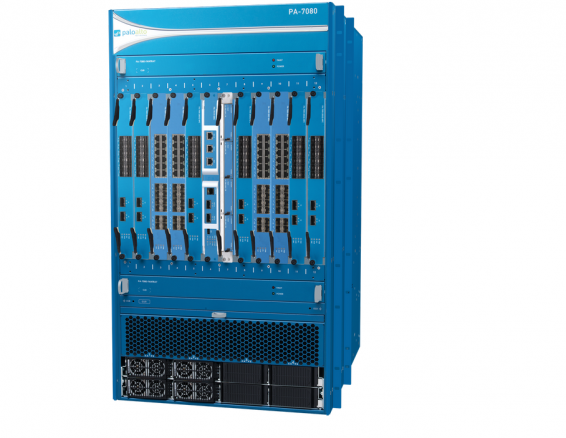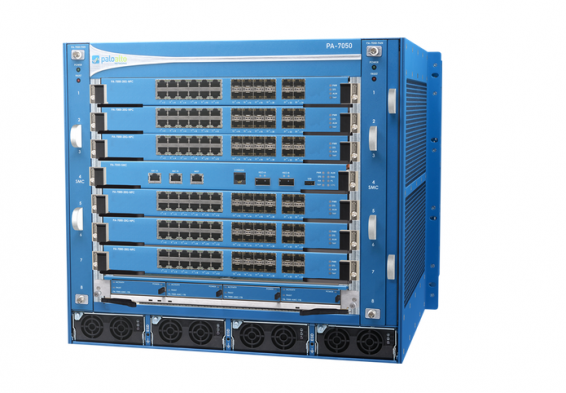Overview:
Redefining high-performance network security, the PA-7000 Series of next-generation firewall appliances offers the perfect blend of power, intelligence and simplicity. Power, derived from a proven architecture, blends ultra-efficient software with nearly 700 function-specific processors for networking, security, content inspection and management. Its intelligence maximizes security-processing resource utilization and automatically scales as new computing power becomes available. The PA-7000 Series offers simplicity defined by a single-system approach to management and licensing.
Key Security Features:
- Classifies all applications, on all ports, all the time
- Identifies the application, regardless of port, encryption (SSL or SSH), or evasive technique employed.
- Uses the application, not the port, as the basis for all of your safe enablement policy decisions: allow, deny, schedule, inspect and apply traffic-shaping.
- Categorizes unidentified applications for policy control, threat forensics or App-ID™ development. Enforces security policies for any user, at any location
- Deploys consistent policies to local and remote users running on the Windows®, MacOS™, Linux®, Android®, or Apple® iOS platforms.
- Enables agentless integration with Microsoft® Active Directory® and Terminal Services, LDAP, Novell® eDirectory™ and Citrix®.
- Easily integrates your firewall policies with 802.1X wireless, proxies, NAC solutions, and any other source of user identity information. Prevents known and unknown threats
- Blocks a range of known threats, including exploits, malware and spyware, across all ports, regardless of common threat-evasion tactics employed.
- Limits the unauthorized transfer of files and sensitive data, and safely enables non-work-related web surfing.
- Identifies unknown malware, analyzes it based on hundreds of malicious behaviors, and then automatically creates and delivers protection.
- Threat prevention throughput is measured with App-ID, User-ID, IPS, antivirus, anti-spyware and Disable Server Response Inspection(DSRI) features enabled
- Throughput is measured with 64Kb HTTP transactions
- Connections per second is measured with 4Kb HTTP transactions
| Performance and capacities | PA-7080 system | PA-7050 system | PA-7000 NPC | PA-7000 NPC-XM2 |
|---|---|---|---|---|
| Firewall throughput (App-ID enabled) | 200 Gbps | 120 Gbps | 20 Gbps | 20 Gbps |
| Threat prevention throughput (DSRI Enabled) | 160 Gbps | 100 Gbps | 16 Gbps | 16 Gbps |
| Threat prevention throughput | 100 Gbps | 60 Gbps | 10 Gbps | 10 Gbps |
| IPsec VPN throughput | 80 Gbps | 48 Gbps | 8 Gbps | 8 Gbps |
| Max sessions | 80,000,000 | 48,000,000 | 4,000,000 | 8,000,000 |
| New sessions per second | 1,200,000 | 720,000 | 120,000 | 120,000 |
| Virtual systems (base/max1) | 25/225* | 25/225* | – | – |
1 Adding virtual systems to the base quantity requires a separately purchased license.
2 Network processing card with enhanced session capacity.


















